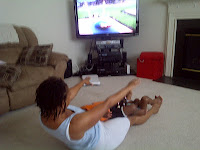 |
| Jeff Rasley |
My travel adventures over the years have taken me to many places far more exotic than Pleasureville, KY, and led to encounters with characters more interesting than incompetent Chicago drug dealers. But that first great adventure inspired a habit of keeping a travel journal. As I developed an interest in writing and began to practice the craft by submitting feature articles, my journal served as a primary source.
Of course, a publishable article requires more than a mere recording of events. The serious memoir writer must interpret meaning from one's experiences, but meaning beyond the immediacy of the moment. I would record in my journal the facts of a travel experience and my reaction to it. To turn the journal writing into a worthy article or book there had to be an insight, lesson or wisdom which I could offer to others.
The personal essays I have been inspired to write are mostly about extreme experiences such as Himalayan mountain climbing or solo sea-kayaking. I have learned important lessons about life from these adventures. For example, I was inspired to write about the strength and beauty of the human spirit and the willingness to be self-sacrificial after witnessing a Nepalese guide and porter risk their lives to save and care for others who had been trapped by an avalanche. I wrote about the need to respect other species and their habitat after an encounter with a mother humpback whale and calf. The mother allowed me to caress her calf because I approached them with respect.
After twenty years of article writing I had accumulated enough material and confidence to risk a book. I was lucky. I sent it unsolicited without representation to Conari Press, and they published Bringing Progress to Paradise.
Essential to making a memoir interesting and worthy of publication is to have a central theme that carries the narrative forward. Without a thematic narrative, we are back to mere observation or a random collection of insights without a guiding light. The narrative must include factual details to make it interesting. Without interesting, quirky or astonishing factual details, a personal essay is boring. A point made in the abstract is likely to be forgotten as soon as the reading device is turned off.
Finally, the memoirist should have a fine tuned sense of personal ethics. The last point I cover when teaching a class about memoir writing is to consider carefully whether to identify or to change the identity of individuals, organizations or companies referred to in the piece. Friendships can be damaged and libel/defamation suits can be filed. It is easy enough to disguise an identity with a fake name and to attribute some intentionally misleading characteristics to protect the privacy or reputation of a person or organization. Consider the consequences and choose wisely.
In Bringing Progress to Paradise a character named Bill represents the quintessential "ugly American" tourist. I included accurate descriptions of Bill's culturally insensitive behaviors in the book. I decided it was important to the narrative theme to show the negative of one of the truths I wanted to convey, which was how to engage productively with local people in alien cultures. The name "Bill" was a pseudonym and aspects of him were changed so as to disguise his identity. Still, I lost a friendship as a result of the book. I'm still ambivalent about whether it was worth it.
Jeff is giving away a copy of Bringing Progress to Paradise to one lucky commenter on this post. Good luck!
***
Jeff Rasley is author of Monsters of the Midway, Light in the Mountains—A Hoosier Quaker Finds Communal Enlightenment in Nepal, Islands in My Dreams, Nepal Himalayas in the Moment, False Prophet and Bringing Progress to Paradise. He has published numerous articles and photos in academic and mainstream periodicals, including Newsweek, Chicago Magazine, ABA Journal, Family Law Review, Pacific Magazine, Indy’s Child, The Journal of Communal Societies, The Chrysalis Reader, Faith & Fitness Magazine, Friends Journal and Real Travel Adventures International Magazine.
An avid outdoorsman and recreational athlete, Rasley leads trekking-mountaineering expeditions in Nepal and has solo-kayaked around several Pacific island groups. He is currently partner in Knowledge Capture Publishing and Editing, president of the Basa Village Foundation USA Inc. and U.S. liaison for the Nepal-based Himalayan expedition company, Adventure GeoTreks, Ltd. He teaches classes for IUPUI Continuing Ed. Program and Indiana Writers Center.
Jeff Rasley's website: http://www.jeffreyrasley.com
His author page on Amazon: http://tinyurl.com/jeffrasleypage









